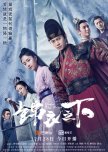Just if you are interested in historical accuracy
I have started to watch this drama when it began to air in december 2019 and since then I rewatched it at least 3 times completely and several times just skipping to my favourite scenes.
As there are already many reviews about the acting and the story line I am just going to add a few lines about historical accuracy.
As I have seen many historical/costume dramas over the years it can get somewhat annoying how nonsensical they are dealing with history (of course sometimes it's intended or just not important).
This drama, however, is different. I am far from saying that it is 100% accurate, but we have many things, characters and even lines that are true to their historical origin.
The story is after a book with the same name, for those who haven't read the book: the story line is pretty much the same. The biggest difference might be, that the drama story is set 20 years later then the book, but that doesn't change much about the story.
The actual main plot was the fight for power between the Yan family and the Lu family, which really happend. The Jiajing emperor is described as a cunning and manipulativ man who understood it to benefit from the powerstruggle. So the characters Emperor Jiajing, Head of the Embroiderd Guards Lu Ting and the first minister Yan Song all actually existed. Lu Ting really died because of Yan Song and just like in the drama Yan Song was banned to his hometown (in remembrance of the long time he had served the emperor), just to be executed by the emperor's son shortly after his death.
The emperor was very much into taoism, so even though our dear Lan Pianzi or Lan Qingxuan is not based on a real person he might as well have been.
So much for the characters.
Now, the embroiderd guards were a very powerful instance during the Ming Dynasty end especially towards the end of the dynasty they had achieved great power and were dreaded and feared for their ruthless conduct. The Liushanmen where Jin Xia works as an unimportant officer existed as well. So the embroidered guards were for the big cases and safety in the capital and the palace and smaller cases were first given to the Liushanmen or other similare authorities. As for the japanese pirates roaming around the coasts of Hangzhou, they too, existed. The late Ming Dynasty had a hugh problem with piracy and robbers. Even the fight for the city took place, not exactly as portraied in the drama, but it really happend.
Last but not least, the costumes. As propably known costumes in costume dramas are usually just made for the eye and, except for the recently popular Qing Dynasty palace dramas, not the least bit authentic.
This drama is slightly better. The uniform of the embroidered guards looked like that, with differing colours for different ranks, the length and the embroidery. But well, a drama that is named after the embroidered guards should at least get their costumes right. The rest of the costumes are at least not so off, that it would distract from watching the drama.
All in all very well produced!!
As there are already many reviews about the acting and the story line I am just going to add a few lines about historical accuracy.
As I have seen many historical/costume dramas over the years it can get somewhat annoying how nonsensical they are dealing with history (of course sometimes it's intended or just not important).
This drama, however, is different. I am far from saying that it is 100% accurate, but we have many things, characters and even lines that are true to their historical origin.
The story is after a book with the same name, for those who haven't read the book: the story line is pretty much the same. The biggest difference might be, that the drama story is set 20 years later then the book, but that doesn't change much about the story.
The actual main plot was the fight for power between the Yan family and the Lu family, which really happend. The Jiajing emperor is described as a cunning and manipulativ man who understood it to benefit from the powerstruggle. So the characters Emperor Jiajing, Head of the Embroiderd Guards Lu Ting and the first minister Yan Song all actually existed. Lu Ting really died because of Yan Song and just like in the drama Yan Song was banned to his hometown (in remembrance of the long time he had served the emperor), just to be executed by the emperor's son shortly after his death.
The emperor was very much into taoism, so even though our dear Lan Pianzi or Lan Qingxuan is not based on a real person he might as well have been.
So much for the characters.
Now, the embroiderd guards were a very powerful instance during the Ming Dynasty end especially towards the end of the dynasty they had achieved great power and were dreaded and feared for their ruthless conduct. The Liushanmen where Jin Xia works as an unimportant officer existed as well. So the embroidered guards were for the big cases and safety in the capital and the palace and smaller cases were first given to the Liushanmen or other similare authorities. As for the japanese pirates roaming around the coasts of Hangzhou, they too, existed. The late Ming Dynasty had a hugh problem with piracy and robbers. Even the fight for the city took place, not exactly as portraied in the drama, but it really happend.
Last but not least, the costumes. As propably known costumes in costume dramas are usually just made for the eye and, except for the recently popular Qing Dynasty palace dramas, not the least bit authentic.
This drama is slightly better. The uniform of the embroidered guards looked like that, with differing colours for different ranks, the length and the embroidery. But well, a drama that is named after the embroidered guards should at least get their costumes right. The rest of the costumes are at least not so off, that it would distract from watching the drama.
All in all very well produced!!
Vond je deze recentie nuttig?






